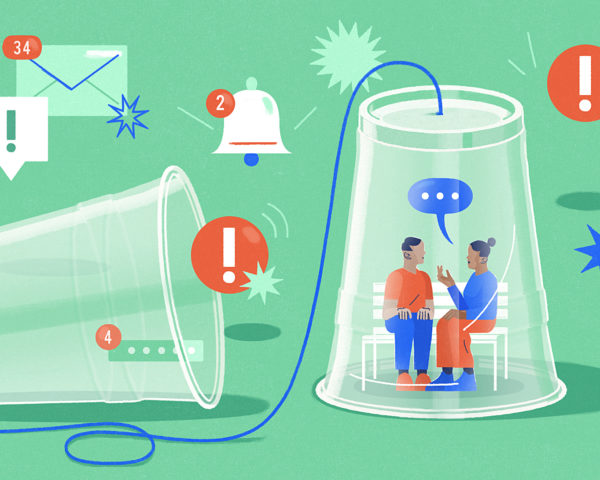Emotional intelligence (also called emotional quotient, or EQ) is our ability to recognize and positively manage our own emotions, as well as the emotions of other people – in some ways, the quintessential interpersonal skill. Research shows that emotional intelligence has a direct impact on your ability to make sound decisions, build stronger relationships, manage your own stress, and perform at your best.
5 components of emotional intelligence
This type of emotional awareness might feel like an inexact science – as if you’re just supposed to naturally pick up on the “vibe” of a group or situation. However, digging deeper into emotional intelligence reveals that it’s fairly well-defined. Research breaks it down into five main components:
- Self-awareness: having a clear and accurate understanding of your strengths, weaknesses, thoughts, feelings, and overall personality
- Self-regulation: recognizing impulses and actively controlling your reactions
- Self-motivation: finding personal reasons to persevere toward your goals and ambitions
- Empathy: understanding someone else’s experiences, perspectives, and feelings
- Social skills: interacting effectively and appropriately with other people
You need all of them to have a high level of emotional intelligence; recognizing an emotion does you no good if you’re not able to respond to it appropriately.
4 ways to improve emotional intelligence
It’s tempting to think that emotional intelligence is something that people are born with – as if they’re naturally good at being in tune with inner feelings.
But take one look at a toddler’s completely unfounded meltdown and you’ll quickly realize that emotional intelligence isn’t inherent – it’s a skill that can be practiced and refined. Here’s how.
1. Recognize and name your own emotions
Stop right now and answer this question: How do you feel? Can you identify and make sense of your emotions?
Doing this exercise regularly builds your ability to identify and manage your emotions – and eventually get to the “why” behind them. The simple act of naming your feelings aloud (as in, “I feel stressed”) reduces the severity of the emotion – a concept known as “name it to tame it,” coined by psychiatrist, Dr. Dan Siegel.
2. Practice mindfulness
Recognizing what you’re feeling is important, but to build emotional intelligence, you actually need to connect with those emotions – to not just acknowledge them, but to actively feel them. Dr. Siegel created an acronym that helps you slow down and sit with whatever you’re feeling: SIFT. Here’s what it stands for:
- Sensations: What sensations do you feel, like tense muscles or a faster heart rate?
- Images: What images do you see in your mind?
- Feelings: What emotional state are you in?
- Thoughts: What thoughts are running through your mind?
Closing your eyes and working through those four things will help you focus on the present moment (and your present emotions).
3. Ask for feedback
While 95% of people think they’re self-aware, research shows that only 10-15% of people actually are. Our own perceptions and experiences can bias our thinking, which makes it tough to get a realistic grasp on how we present ourselves to the world.
That’s why feedback – and especially 360-degree feedback, from a variety of sources around you – can be so valuable. When aiming to boost your emotional intelligence, try asking people specific questions that pertain to that skill, such as:
- How do you see me respond to difficult problems?
- How do I conduct myself in stressful situations?
- How empathetic do you think I am?
- How do see me show up in a conflict?
4. Commit to active listening
A lot of emotional intelligence is understanding and managing your own emotions. But the emotions of other people are a big piece too – and those are impossible to pick up on if you don’t give others your full attention. You might miss out on an offhand remark, a nonverbal cue like a facial expression or gesture, or a slight change to vocal pitch or pace.
That’s why active listening – the most engaged form of listening – is so helpful. A few tricks to actively listen include:
- Eliminating or minimizing distractions
- Maintaining eye contact (aim for three seconds before looking away)
- Avoiding interrupting
- Paraphrasing what someone has said to confirm your understanding
This approach forces you to give someone your full attention when communicating so you can read between the lines and develop a far more complete and nuanced grasp of how they feel and what they say.













































